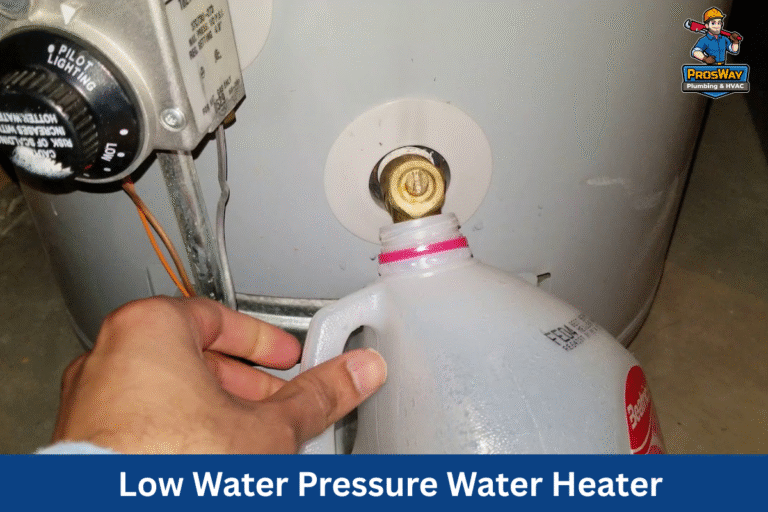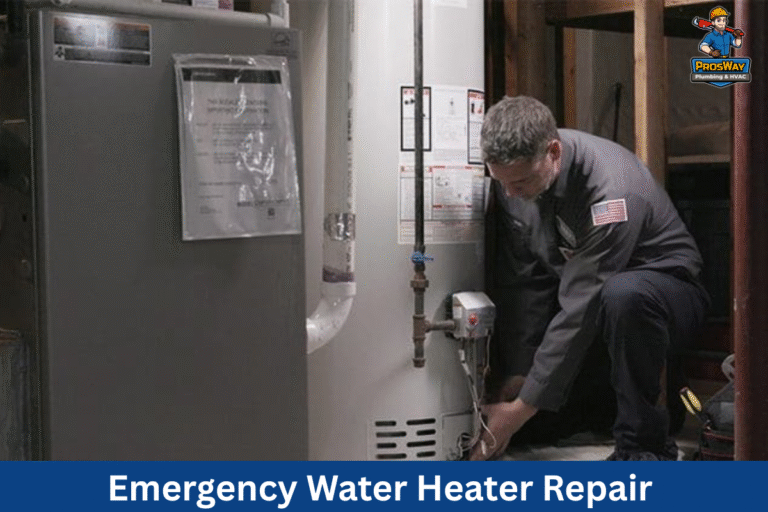An oil-like smell from a water heater can be alarming. It raises concerns about leaks, contamination, or even fire risk. Homeowners often describe the odor as oily, gassy, or chemical, and it may appear suddenly after installing a new hot water heater or after years of use.
The good news is that this issue has identifiable causes, many of which are minor. In some cases, flushing the tank or replacing an anode rod solves the problem. However, persistent or strong odors can signal fuel supply issues, faulty electrical wiring, or bacterial activity inside the tank. This guide outlines the common causes behind your water heater smells like oil, the signs, and how to get rid of such odors.
Why Does My Water Heater Smell Like Oil?
A water heater that smells like oil may not actually be leaking oil. The odor can originate from multiple sources, and correctly identifying the cause is essential for safety.
The smell may come directly from the heater, from the fuel supply in gas or oil-fired units, from the water supply itself, or from the surrounding environment.
- From the heater: Sediment, sulfates, or bacterial growth inside the water heater tank can create odors that resemble oil or sulfur.
- From the fuel supply: Poor combustion in gas or oil-fired water heaters can release chemical or oily smells, sometimes accompanied by incomplete venting.
- From the water supply: High iron or manganese levels in private wells, or reactions between sulfates and magnesium anode rods, may generate hydrogen sulfide gas, which produces a rotten egg or oily smell.
- From the environment: Nearby HVAC systems, garages, or external oil leaks can allow odors to seep into the heater’s location, leading homeowners to think the water heater is the source.
Distinguishing between harmless odors (like mineral reactions in the tank) and warning signs (like fuel leaks or burning insulation) is critical. A safe rule of thumb: persistent or worsening oil-like smells should always be checked by a professional plumber or HVAC technician.
Common Causes of Oil Smells from Water Heaters
Strange odors from a water heater often come from specific mechanical or chemical issues. Knowing the source makes it easier to address the problem safely and effectively.
Sediment and Bacteria in the Tank
Sediment buildup, mainly calcium, magnesium, and iron, creates a layer at the bottom of the tank. Over time, bacteria such as sulfur-reducing bacteria can thrive in this warm, low-oxygen environment.
These microbes react with sulfates in the water, releasing hydrogen sulfide gas. The result is a smell often described as rotten eggs, sewage, or even an oily odor. Homes with private wells experience this problem more frequently than homes with municipal supply water.
Contaminants in the Water Supply
Water quality issues can also cause an oil-like odor. In older homes with steel or iron pipes, corrosion can leach metallic residues into hot water.
In well water systems, hydrocarbons or organic materials in the soil may contaminate the water supply. Municipal disturbances, like nearby construction or pipeline repairs, sometimes stir up sediments and introduce temporary odors.
Fuel Supply or Burner Issues (Gas and Oil-Fired Heaters)
Gas water heaters and oil-fired models rely on clean combustion. When the burner or gas valve malfunctions, incomplete combustion produces strong, oily, or chemical odors.
This can be a serious safety hazard, as poor combustion also increases the risk of carbon monoxide buildup. Any smell resembling oil or gas from the burner area needs immediate professional attention.
Electrical Wiring or Overheating Components
In electric water heaters, faulty wiring or overheated insulation inside the access panels may produce a burning oil smell. Damaged heating elements buried in sediment or a failed thermostat can overheat, burning nearby insulation or plastic. This is a repair issue and a fire hazard.
Nearby Environmental Factors
Not all oil smells come directly from the water heater. Units installed in garages, attics, or utility spaces can pick up odors from HVAC systems, oil containers, or nearby mechanical equipment.
In such cases, the smell may appear to come from the heater but actually originates from the surrounding environment.
Warning Signs That Point to Serious Problems

Some odors are temporary, but others indicate urgent risks. Recognizing the difference helps prevent costly damage or health hazards.
- Persistent odor after flushing: Sediment or bacteria may not be the problem. This points to tank corrosion or fuel issues.
- Smell spreading through the house: Strong odors carried through hot water lines or air circulation signal a system-wide concern.
- Discolored or oily-looking water: Rust, iron, or oil contamination requires immediate testing and plumbing inspection.
- Odor combined with smoke, burning, or gas smell: A clear safety hazard that should not be ignored.
- New heater still producing smell: May indicate incorrect installation, faulty anode rod, or electrical issues.
How to Fix an Oil Smell Coming from a Water Heater?
Follow these steps to get rid of the oil smell coming from your water heater:
Flush the Tank
Flushing removes sediment, limescale, and bacteria that often cause odors. Start by shutting off the power (breaker for electric or gas valve for gas units) and allowing the water to cool.
Attach a garden hose to the drain valve and empty the tank into a safe drain area. Refill and drain until the water runs clear.
Disinfect and Treat the Tank
Bacteria in the water heater tank react with magnesium or aluminum anode rods, producing hydrogen sulfide, the rotten egg odor often mistaken for oil or sewage.
A common treatment uses hydrogen peroxide or a vinegar solution circulated through the tank for a few hours before flushing again. Unlike masking agents, this approach kills odor-causing bacteria directly.
Inspect Fuel Supply and Burner
For gas or oil-fired water heaters, improper combustion leaves behind chemical or oily smells. Check that the burner is clean, the gas control valve is set properly, and the exhaust vent is clear. Poor ventilation increases the risk of carbon monoxide exposure, making this step critical.
Check Electrical Components
In electric water heaters, a burning oil odor can come from failing insulation, overheated wiring, or a short at the lower heating element.
Look for scorched wires behind the access panel and replace damaged components immediately. Electrical issues pose a fire hazard and should be handled by a licensed technician.
Address Water Source Issues
Sometimes the water supply itself is the cause. High iron, manganese, or sulfates in well water produce odors when heated. A water test kit helps identify contaminants.
In these cases, installing a whole-house iron filter, reverse osmosis system, or water softener may be necessary. Municipal water users can contact their utility company to report possible supply contamination.
Prevention Tips to Keep Water Heaters Odor-Free

- Annual Maintenance: Flush the tank at least once a year to clear sediment and bacteria.
- Anode Rod Plan: Inspect the magnesium or aluminum anode rod every 2–3 years. Replace with a powered anode rod (titanium) if sulfur odors keep returning.
- Ventilation: Keep the heater area well-ventilated, especially in attics and garages, to prevent odor buildup.
- Water Treatment: In hard water regions, install a softener or purification system to reduce limescale and iron buildup.
- Temperature Control: Keep the water heater set between 115–120°F. Higher temperatures may reduce odor but increase burn risk.
Final Thoughts
An oil-like odor coming from your water heater may not always mean disaster, but it should never be brushed off. In many cases, it’s linked to sediment buildup, a deteriorating anode rod, or harmless bacteria inside the tank. However, persistent or strong smells, especially those resembling gas, burning, or sewage, can point to fuel supply issues, faulty wiring, or even dangerous combustion problems. Acting early keeps your water safe, prevents system damage, and protects your household from health risks.
Restore Comfort and Safety With ProsWay Plumbing & HVAC!
Strange smells from your water heater need expert eyes. ProsWay Plumbing & HVAC’s licensed plumbers and HVAC technicians diagnose everything from odor-causing bacteria and corroded anode rods to burner malfunctions and electrical issues. With fast service across Northern New Jersey, we’ll flush, disinfect, repair, or replace your unit so you can enjoy clean, safe, odor-free hot water. Call us now at (862) 260-5870 or Book Online today and schedule your inspection before a minor odor becomes a major hazard.








